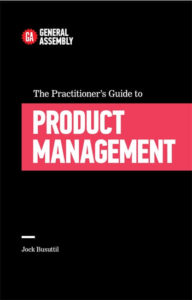
PRODUCTHEAD: More product coach, less line manager
PRODUCTHEAD is a regular newsletter of product management goodness,
curated by Jock Busuttil.
my iron product
tl;dr
A product coach should measure their own job performance by the successes of their team members
Strive to develop a capacity for learning in the people you supervise
Coaching taps into an individual’s own wisdom and keeps them accountable for achieving their goals
People who are genuinely committed to change but nonetheless dig in their heels may be unwittingly self-sabotaging
a favour: please share this with other product people
every PRODUCTHEAD edition is online for you to refer back to
hello
As a product manager becomes more experienced, I think that an increasing part of their role is to coach and share their experience with other product managers, whether or not they want to end up in a team management role.
Few organisations adequately prepare their staff to take on a line management role; far fewer still help their manager to understand the importance of adopting a coaching approach over a more directive one.
For me, the role of a line manager is broadly to provide two functions. The first is to handle what I’m going to generalise as ‘pastoral care’ — onboarding new team members, dealing with the HR-related admin for team members being off work for one reason or another, that kind of thing. The second is the coaching aspect of the role — helping individuals to grow professionally and achieve their potential. Of the two aspects, coaching is in my view the more difficult, but also the most rewarding aspect of team management.
However, the combination of these two responsibilities can create a slight conflict of interest. Some of you will have have suffered through having a terrible manager. They’re the ones who say one thing and do another, have no trust in their team, and who are clearly looking out for their own interests first.
When a team member is faced with a manager like this, they have to be super-careful with what they say and do because showing any ‘weakness’ will generally work to their disadvantage in one way or another. It might result in a poor performance review, meaning a missed pay rise or similar. It just teaches the team member not to be open, because there’s no mutual trust.
So when a team member who’s had a terrible manager in the past is now confronted with a good manager who’s genuinely on their side and wants to coach them to succeed, it’s understandable that they might be a little reticent to open up to them.
In my view at least, it’s imperative that a line manager establishes mutual trust with their team before they can meaningfully start to coach them. One-to-one coaching sessions need to be psychologically safe spaces. Trust has to be earned, and the only thing a line manager can directly control is how much they trust their team. That’s a good starting point.
This week I have some articles for you that I’ve found to be helpful for product leaders adopting a coaching mindset.
Speak to you soon,
Jock
P.S. There’s 20% off passes to PLA’s Product-Led Festival in April for PRODUCTHEAD subscribers this week – take a look below.
what to think about this week
The coaching mindset
In this article, I’d like to focus not on the PM’s mindset, but rather on the necessary mindset of the coach.
The wrong mindset may lead you to apply these tools in ways that actually undermine their intent. For example, you may be committed to having regular 1:1’s with each of your team members, but if these meetings consist primarily of you allocating and prioritizing tasks, they are not helpful, and likely even harmful as a coaching tool.
Developing people is the single most important part of your job
[CHRIS JONES / SILICON VALLEY PRODUCT GROUP]
The leader as coach
To cope with disruptive change, companies are reinventing themselves as learning organizations. This requires a new approach to management in which leaders serve as coaches to those they supervise.
In this new approach, managers ask questions instead of providing answers, support employees instead of judging them, and facilitate their development instead of dictating what has to be done. But most managers don’t feel they have time for that—and they’re not very good at it anyway.
Model the behaviour you want your team to adopt
[HERMINIA IBARRA & ANNE SCOULAR / HARVARD BUSINESS REVIEW]
The best managers don’t fix, they coach — four tools to add to your toolkit
Think about your typical week as a manager. How many times did you help your direct reports by trying to solve their problem? The answer is probably as many times as you met with them. While that’s common among managers, it’s not always optimal.
Too often, managers feel the best way to add value is by fixing someone’s problem. “I know the answer, and I need to tell them,” we say to ourselves. But over-relying on fixing constrains our ability to lead and robs our team members of growth opportunities.
Be intentional about getting incrementally better each day
[ANITA HOSSAIN CHOUDHRY & MINDY ZHANG / FIRST ROUND REVIEW]
The real reason people won’t change
Every manager is familiar with the employee who just won’t change. Sometimes it’s easy to see why—the employee fears a shift in power, the need to learn new skills, the stress of having to join a new team. In other cases, such resistance is far more puzzling. An employee has the skills and smarts to make a change with ease, has shown a deep commitment to the company, genuinely supports the change—and yet, inexplicably, does nothing. What’s going on?
Uncovering the competing commitment
[ROBERT KEGAN & LISA LAHEY / HARVARD BUSINESS REVIEW]
recent posts
Sorting the signal from the noise — a guide to fact-checking
One of the most important, and arguably hardest jobs we have as product managers is to work with our team to sift through information, read between the lines, and verify what is fact and what is merely opinion.
[I MANAGE PRODUCTS]
Start building a community of practice with the 3 minute challenge
When you start out as a head of product (or product director or VP product), you’ll probably need to create a community of product people. In this latest entry for my series of 100 things I’ve learned about product management, I share my advice to help you get the ball rolling with your own community of practice.
[I MANAGE PRODUCTS]
Should a growth product manager even be a thing?
There’s an ongoing debate about generalist product managers versus emerging product manager specialisms (such as ‘growth product manager’). I think there is room in our profession for both. Let me explain.
“No one wants to get rich slow”
[I MANAGE PRODUCTS]
upcoming talks and events
5-6th April 2022
Product-Led Festival #

The Product-Led Festival is back. 🎉
Join us on April 5-6 for 20+ hours of captivating content from 30+ of the best in product, including:
🎙 Airbnb – Group Product Manager
🎙 Monzo – Senior Product Manager
🎙 wefox – Chief Product Officer
🎙 MyFitnessPal – Senior Product Manager
🎙 GitLab – Group Product Manager
🎙 Zoom – Senior Product Manager
There’s no better place to connect with product trailblazers, take away invaluable insights and build long-lasting professional relationships. 🤝
Subscribers get 20% off an Access All Areas pass, just use PROD20 at checkout 💸
Grab your pass 👉
can we help you?
Product People is a product management services company. We can help you through consultancy, training and coaching. Just contact us if you need our help!
Helping people build better products, more successfully, since 2012.
PRODUCTHEAD is a newsletter for product people of all varieties, and is lovingly crafted from the green shoots of Spring.


Leave a Reply